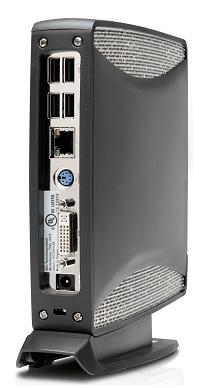3
I was wondering how come I don't see many businesses using thin clients (workstations), like this one:

Are they an outdated technology? Any cons or reasons why not to use them? What is the best alternative?
3
I was wondering how come I don't see many businesses using thin clients (workstations), like this one:

Are they an outdated technology? Any cons or reasons why not to use them? What is the best alternative?
1
Two areas where I still see thin clients dominate over full-fledged PC's, are the healthcare industry (doctors/dentists/optometrists) and also in support centers. In both cases, these clients are acting as dumb terminals, serving up browser-based application software that needs to be ubiquitous across the organization.
5
Definitely not. Thin clients are more of a concept than a hard fast technology. Whereas 10 years ago we might have a server which booted thin clients using a remote disk, it is more prevalent now to see thin clients used in the context of Virtual Desktop Infrastructure. Conceptually this is the same as a thin client. Look at Wyse terminals used with Citrix XenDesktop. Wyse & Citrix
3As a slight addition: The target market is not really "businesses", it's places like Universities and hospitals where they want a similar user-profile shared across various places people may be with minimal overhead. Of course, that requires a domain control - but the performance is low enough where your employees would lose productivity due to the Virtual Desktops. Of course, the benefit is every log-out is essentially a reset switch on the Desktop to avoid accruing crap-ware/malware/viruses. – nerdwaller – 2012-12-06T17:30:45.120
@nerdwaller - Will connecting an 'actual' PCs as a network might improve performence? for example if I 'share' an application with these workstations and experience performance issues, will switching to PCs connected with network might help? Are there any cons to workstations what so ever? – BornToCode – 2012-12-06T17:43:00.893
@BornToCode - Not sure I am totally following you, but you're still cramming loads of data through a relatively small pipe-line (unless you run optical lines). So regardless of what machine is where, you would see some degradation of performance. But connecting "actual pcs" over the network is what the server that is hosting the virtualization is doing. Yes, cons: price, overhead, locally hosted OS (more open to virus, malware, etc.), size, space, replacement costs, likely part wear, etc. I assume by workstation you mean a real, physical, tower. – nerdwaller – 2012-12-06T18:28:35.253
@nerdwaller - Thank you for the info, actually by workstation I meant those small 'toys' like posted in the image of my question. I'd like to know if an office asks my advice if the requirment is to be able to work on the same progam/files from different rooms, which setup is preferable - few thin workstations connected to 1 tower, or few towers which are all connected as a network with a hub or router? – BornToCode – 2012-12-06T19:45:40.930
Actually I also stumbled it in a health center, Is there any particular reason why they prefer it over full fledged PC's? I'm asking because I'd like to know what is the preferable way to work in a small office with few 'spots' that need to use the same program/files. – BornToCode – 2012-12-06T19:35:44.830
Healthcare systems only need a browser and network connectivity to work, they are less prone to viruses and meddling, have a small footprint/low power consumption, and they're good enough for the given use case. At the end of the day, it all comes down to the need. Office-oriented systems usually need more productivity tools (i.e. Microsoft Office) and somewhere to store files. – Ian Atkin – 2012-12-06T19:52:07.697